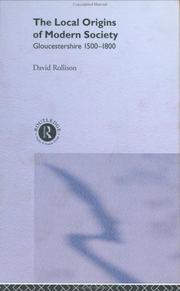| Listing 1 - 5 of 5 |
Sort by
|

ISBN: 9780521853736 9780521139700 9780511807541 9780511770036 0511770030 0521853737 0521139708 0511807546 1107209927 0511848099 1282652915 9786612652912 0511769199 0511766963 0511765576 0511768354 9781107209923 9780511848094 9781282652910 6612652918 9780511769191 9780511766961 9780511765575 9780511768354 Year: 2010 Publisher: Cambridge Cambridge University Press
Abstract | Keywords | Export | Availability | Bookmark
 Loading...
Loading...Choose an application
- Reference Manager
- EndNote
- RefWorks (Direct export to RefWorks)
In 1500 fewer than three million people spoke English; today English speakers number at least a billion worldwide. This book asks how and why a small island people became the nucleus of an empire 'on which the sun never set'. David Rollison argues that the 'English explosion' was the outcome of a long social revolution with roots deep in the medieval past. A succession of crises from the Norman Conquest to the English Revolution were causal links and chains of collective memory in a unique, vernacular, populist movement. The keyword of this long revolution, 'commonwealth', has been largely invisible in traditional constitutional history. This panoramic synthesis of political, intellectual, social, cultural, religious, economic, literary and linguistic movements offers a 'new constitutional history' in which state institutions and power elites were subordinate and answerable to a greater community that the early modern English called 'commonwealth' and we call 'society'.
History of the United Kingdom and Ireland --- anno 1100-1199 --- anno 1200-1499 --- anno 1600-1699 --- anno 1500-1599 --- anno 1000-1099 --- Political culture --- Popular culture --- Populism --- Community life --- Collective memory --- Social change --- Change, Social --- Cultural change --- Cultural transformation --- Societal change --- Socio-cultural change --- Social history --- Social evolution --- Collective remembrance --- Common memory --- Cultural memory --- Emblematic memory --- Historical memory --- National memory --- Public memory --- Social memory --- Memory --- Social psychology --- Group identity --- National characteristics --- Associations, institutions, etc. --- Human ecology --- Political science --- Culture --- History. --- Political aspects --- Great Britain --- Politics and government --- Social conditions. --- Arts and Humanities --- History
Multi
ISSN: 14769107 ISBN: 1283620294 9786613932747 184615989X 1843836718 Year: 2011 Volume: v. 10 Publisher: Woodbridge, Suffolk ; Rochester, N.Y. : Boydell Press,
Abstract | Keywords | Export | Availability | Bookmark
 Loading...
Loading...Choose an application
- Reference Manager
- EndNote
- RefWorks (Direct export to RefWorks)
Commune, Country and Commonwealth' suggests that towns like Cirencester are a missing link connecting local and national history, in the immensely formative centuries from Magna Carta to the English Revolution. Focused on a town that made highly significant interventions in national constitutional development, it describes recurring struggles to achieve communal solidarity and independence in a society continuously and prescriptively divided by gross inequalities of class and status. The result is a social and political history of a great trans-generational epic in which local and national influences constantly interacted. From the generation of Magna Carta to the regicides of Edward II and Richard II, through the vernacular revolution of the 'long fifteenth century' and the chaos of state reformations to the great revival that ended in the constitutional wars of the 1640s, the epic was united by strategic location and by systemic, 'structural' inequalities that were sometimes mitigated but never resolved. Individual and group personalities emerge from every chapter, but the 'personality' that dominates them all, Rollison argues, is a commune with 'a mind of its own', continuously regenerated by enduring, strategic realities. An afterword describes the birth and development of a new, 'rural' myth and identity and suggests some archival pathways for the exploration of a legendary English town in the modern and postmodern, industrial and post-industrial epochs. DAVID ROLLISON is Honorary Research Associate in History, University of Sydney.
Cirencester (England) --- Cirencester, Eng. --- Cirencester (Gloucestershire) --- Corinium (England) --- Cicester (England) --- Ciceter (England) --- Ciren (England) --- Cirenchester (England) --- Corinium Dobunnorum (England) --- Corinum (England) --- Cironium (England) --- Cirecestre (England) --- Cyrescestre (England) --- Cirrenceastre (England) --- Cirneceastre (England) --- Cyrneceastre (England) --- Coryn Ceasre (England) --- Caerceri (England) --- Cair Ceri (England) --- Korinion (England) --- History. --- Social conditions. --- Social life and customs. --- Politics and government. --- HISTORY / Europe / Great Britain / General. --- Artistic Context. --- Cirencester. --- Class Inequalities. --- Communal Solidarity. --- Constitutional Wars. --- English Revolution. --- Local History. --- Magna Carta. --- Modernity. --- National History. --- Rural Myth. --- Social and Political History. --- Urbanization.
Book
ISBN: 9781846159893 9781843836711 Year: 2011 Publisher: Suffolk Boydell & Brewer
Abstract | Keywords | Export | Availability | Bookmark
 Loading...
Loading...Choose an application
- Reference Manager
- EndNote
- RefWorks (Direct export to RefWorks)

ISBN: 0415070007 Year: 1992 Publisher: London New York Routledge
Abstract | Keywords | Export | Availability | Bookmark
 Loading...
Loading...Choose an application
- Reference Manager
- EndNote
- RefWorks (Direct export to RefWorks)
Multi
ISBN: 9781846159893 9781843836711 Year: 2011 Publisher: Suffolk Boydell & Brewer
Abstract | Keywords | Export | Availability | Bookmark
 Loading...
Loading...Choose an application
- Reference Manager
- EndNote
- RefWorks (Direct export to RefWorks)
| Listing 1 - 5 of 5 |
Sort by
|

 Search
Search Feedback
Feedback About UniCat
About UniCat  Help
Help News
News